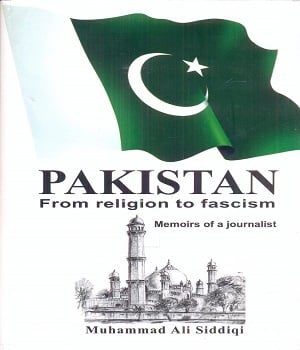
The journalist launched his book at Karach Press Club on Sunday event. Siddiqi, who was chairing the event himself, spoke about his experience at the newspaper he worked for and praised some of the notable names in journalism.
He is presently the readers' editor at Dawn.
Journalist and the author's school friend, Ghazi Salahuddin, called Siddiqi a shareef admi who was the same in school as well. "He's so shareef that he refused to be the hero in his book also," he said, much to the amusement of the audience.
"I read this book as I read newspapers and not as a book," Salahuddin claimed, elaborating on how the bigwigs of journalism have also been mentioned in the book.
The book focuses more on the politics in Pakistan as opposed to author's memoirs, he added. "These types of memoirs are very uncommon."
Highlighting the importance of the contents of the book, Salahuddin said it can be made part of the syllabus in mass communication schools.

Referring to Siddiqi as the 'dulha' at the occasion, former Sindh governor Kamal Azfar said Siddiqi was indeed the groom of his book because he writes about a Karachi that most people want to be a part of as middle class citizens.
"You are the hero of your story," he said to Siddiqi, commending him on his journey from India and then working as a typist in Pakistan for a salary of Rs250. Siddiq has adopted a very unique style of writing in the book, said former minister Javed Jabbar. "He had confessed to me that I (Siddiqi) have used a very topsy turvy approach in it."
The book is quite unconventional in its approach, it swings to and fro to different zones and subjects, yet the stream of consciousness is consistent, Jabbar explained.
Speaking about fascism, Azfar said there was an element of fascism in Ziaul Haq's rule, but he was too inefficient to be a fascist. Women of Pakistan played an integral role in fighting religious fascism, he added.
"The decline towards fascism is not inevitable," he claimed. "Today, there are no fascists in politics of Pakistan that can be elected," he said, pointing towards the nature of the three leading political parties in Pakistan.
Any religion that it brought into state politics has an element of coercion, remarked Jabbar. For instance, the governor of Texas, USA, has to be Christian, he explained.
Published in The Express Tribune, March 14th, 2016.

1722421515-0/BeFunky-collage-(19)1722421515-0-165x106.webp)





1732080054-1/Copy-of-Untitled-(48)1732080054-1-270x192.webp)









COMMENTS (1)
Comments are moderated and generally will be posted if they are on-topic and not abusive.
For more information, please see our Comments FAQ